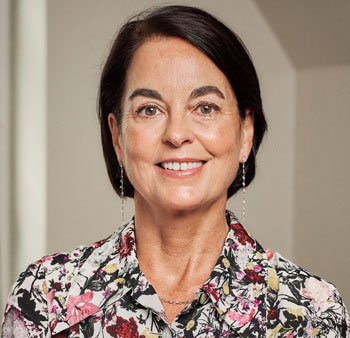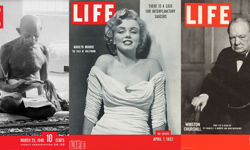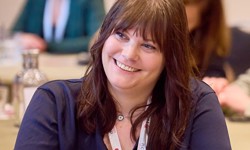
For nearly 25 years, Claire Enders, founder and owner of Enders Analysis, has been a name to be reckoned with in media, communications and technology research.
Her trenchant views, based on analysis of facts and numbers, have been credited with frightening both media executives and inexperienced Culture ministers. It is claimed she has the power to decipher boardroom discussions without being there.
Enders is the go-to person for broadcasters looking for a comment on the latest media deal and she even claims to be the most-quoted analyst in the Financial Times.
“Claire, people say they are really scared of you. To which the answer is: ‘I’m so glad to hear that.’ It’s all grist to the mill,” says the American-born Enders, now more British than the British.

When we speak, Enders is in a fast-talking state of high excitement as one media story after another breaks around her.
“Dana Strong was appointed this morning to replace Jeremy Darroch (chief executive of Sky),” says Enders.
She is a great follower and admirer of senior Comcast executive Strong and knew she would get the top Sky job once Comcast took over control from Rupert Murdoch.
Former banker Richard Sharp is confirmed as the BBC’s next chairman.
“As soon as he surfaced, he was the obvious choice,” notes Enders.
Then news comes Sir Martin Sorrell has spent another $200 million on two acquisitions as he rebuilds his business career following his ousting from WPP.
“Sorrell has been turbocharged from day one. He is an extraordinarily driven 24-hours a day workaholic and he has fantastic links with the banks,” explains the super-analyst who knows everyone worth knowing in the media.
It is claimed she has the power to decipher boardroom discussions without being there.
JPIMedia acquisition
And then she was still chewing over David Montgomery’s extraordinary re-emergence as a local newspaper owner with the £10.2 million acquisition of JPIMedia, the successor to Johnson Press – in a deal spread over three years and three tranches of money.
“I looked at the terms and I thought, shit. They (Johnson Press) were crazy. They made stupid acquisitions. Apart from the debt, they kept buying more pension fund commitments and they overpaid,” notes Enders.
“It’s incredible really. In 2006, that business was worth hundreds of millions of pounds. Now it’s not even worth £10.2 million in a single payment. That’s so bad, awful, shaming,” she adds.
Enders has a particular interest in the local and regional press sparked by self-interest in the Dundee-based publisher DC Thomson. Her husband Christopher Thomson is former chief executive and now chairman of the private 170-year-old company owned by 250 family shareholders.
“I can tell you that DC Thomson is still the most profitable publisher in the UK. I swore to him (Christopher) I would never let them down. Let me tell you of the chances of a business lasting 200 years in the real world. They are one in a billion. But they are going to make it to 200 years,” insists Enders who has just celebrated her 63rd birthday.
DC Thomson, she notes, has always been very cautious – not to mention rather secretive – and only making acquisitions “that make sense”.
On certain occasions, I have said things that were extraordinarily provocative as a way of warning that is where we are headed.
Prospects for National World
Her devotion to Dundee, which included choosing with her husband, the design for V & A Dundee, is understandable but what does the 30-strong Enders Analysis team make of the latest Montgomery deal?
As chief executive of his previous “rodeo”, Local World, Montgomery doubled the value of the business through double-digit revenue growth and cutting costs before selling the majority stake on to Daily Mirror publishers Reach.
His National World, Ender Analysis believes, will however find it “difficult if not impossible” to repeat the cost-cutting exercise at the JPI titles where costs have already been heavily cut.
It is “radical” and against the industry trend to decentralise to locally based editorial and commercial teams rather than increasing centralisation. But Enders Analysis acknowledges Montgomery’s belief that local media has faded because media has stopped believing in itself and in energising the communities it serves so he might be able to stand against the trend.
But how did the American Claire Enders end up in the UK; is she a consultant or an analyst and why did she give up potentially lucrative executive jobs in the British media to found the eponymous company?
After Yale, she came to the London Business School where one of her lecturers was Paddy Barwise, the advertising and marketing specialist. She is in touch with him still and helped on the recent Barwise and Peter York book – The War Against the BBC.
After a spell in venture capital, Enders worked for Virgin, was head of marketing at Superchannel, a director at TVS, the former ITV franchise, before becoming corporate development manager at Thorn EMI.
I think we will have all of the national titles in five years’ time and I think they will still be in paper form.
Calling the shots
She set up Enders Analysis because she “wanted to have more problems to solve” and didn’t want anyone else being able “to call the shots” in her life.
After a “nasty incident”, she didn’t want ever again to share the back of a limo with anyone from the music industry.
There was also enough inherited wealth to enable her to set up her company without debt and own all of it.
Her father Thomas was a senior American diplomat who played a major role in the secret bombing of Cambodia under the Nixon administration. Rather more benignly, a great uncle, John Franklin Enders, won a Nobel prize for scientific research that paved the way for the creation of mass vaccines for polio and measles.
As a different form of researcher, Claire Enders describes herself as a sceptic rather than an advocate.
“I am not a consultant and I give people advice for free,” she says, adding that consultancies are among the more than 200 subscribers to her service.
“We created the niche of independent research and we have one of the most significant businesses in that niche. I am also proud to be able to say it is one of the top 100 companies ever started and owned by a woman in this country,” boasts Enders who has never lacked self-confidence.
She sees it as her “higher calling” to create a knowledge base that tells the extraordinary story of a media industry that lies at the heart of democracy – any democracy.
What she has achieved has been in the teeth of pervasive arthritis, exacerbated by two bouts of Lyme’s disease, the debilitating illness spread by ticks which live on creatures such as deer.
Enders says she has been proud, and right, to argue consistently that “the public service broadcasting system and all of its phenomena are absolutely essential to British culture.”
She is most proud of either inventing or seizing as quickly as it came about, the words ‘creative economy’ and figuring out how such an interrelated system, which employs more than one million people in the UK, actually works.
There is nothing more exciting than looking to see what is going to happen this year, where the numbers are going to go.
Regional closures
Has her method of predicting future trends from assembling the known facts always worked?
Not always.
She may have predicted the initial dotcom crash but in June 2009, Enders told a Commons select committee that half of all local and regional newspapers in the UK would close within the next five years.
On the fifth anniversary of her prediction, HoldtheFrontPage revisited her prophecy that around 650 publications would have been lost by then and found it a long way off beam.
Around 100 had closed, most of them small local free papers, with the only significant paid-for regional casualty, the Liverpool Post.
As HoldtheFrontPage noted at the time, the trouble with Ms Enders’ pronouncements were that, “they were so widely believed at the time that they seemed likely to create a self-fulfilling prophecy about the future of the industry.”
That prediction didn’t come to pass, did it?
“I know that, but what did happen was that half of the employment went but because of consolidation, people kept the titles going. On certain occasions, I have said things that were extraordinarily provocative as a way of warning that is where we are headed,” Enders confesses, adding that an early form of quantitative easing in 2008 had helped both newspapers and commercial broadcasting.
Claire Enders describes herself as a sceptic rather than an advocate.
Future of newspapers
What does she think of newspapers now?
“With newspapers, we are looking at a very complex picture. Those publications that are relying on subscriptions such as the FT and the Wall Street Journal have done really well,” says Enders who also notes that the Daily Mail is still a very profitable title.
The online Independent, by being forced to cut its cloth according to its means, had become The Independent again.
“That title is now in the independent place where The Guardian has vacated,” Enders claims. She believes there will be a smaller base of local titles in future although it would help greatly if the BBC were to double the scale of its support for the Local Democracy Reporting Service to provide more “such special material”.
Despite her 2009 experience, Enders is prepared to make another five year forecast about newspapers – this one more optimistic because of the long drive to common cost and distribution efficiencies.
“I think we will have all of the national titles in five years’ time and I think they will still be in paper form,” says Enders.
One prediction that can safely be made is that Claire Enders will never retire or end her charitable and cultural projects such as classical concerts and the recent privately published volume - Female Voices - devoted to women poets.
“I plan to keep going on and on. I can’t really imagine not working. There is nothing more exciting than looking to see what is going to happen this year, where the numbers are going to go,” Enders explains.
Then she makes her biggest prediction of all.
“This is going to be a fun, fun year,” she insists.
Perhaps more for some than others.
Since the interview, DC Thomson has reported a Covid-related pre-tax loss of £179.6m compared with a profit of £21m last time although the loss was partly due to a fall in value of investments and a write-down in other company assets.
This article was first published in InPublishing magazine. If you would like to be added to the free mailing list, please register here.










